- Browse
- Python For Beginners
Python For Beginners Courses
Python for Beginners courses can help you learn basic programming concepts, data types, control structures, and functions. You can build skills in writing clean code, debugging, and using libraries like NumPy and pandas for data manipulation. Many courses also cover practical applications such as web scraping, data visualization, and automating tasks, providing hands-on experience with tools like Jupyter Notebook and Git.
Popular Python For Beginners Courses and Certifications
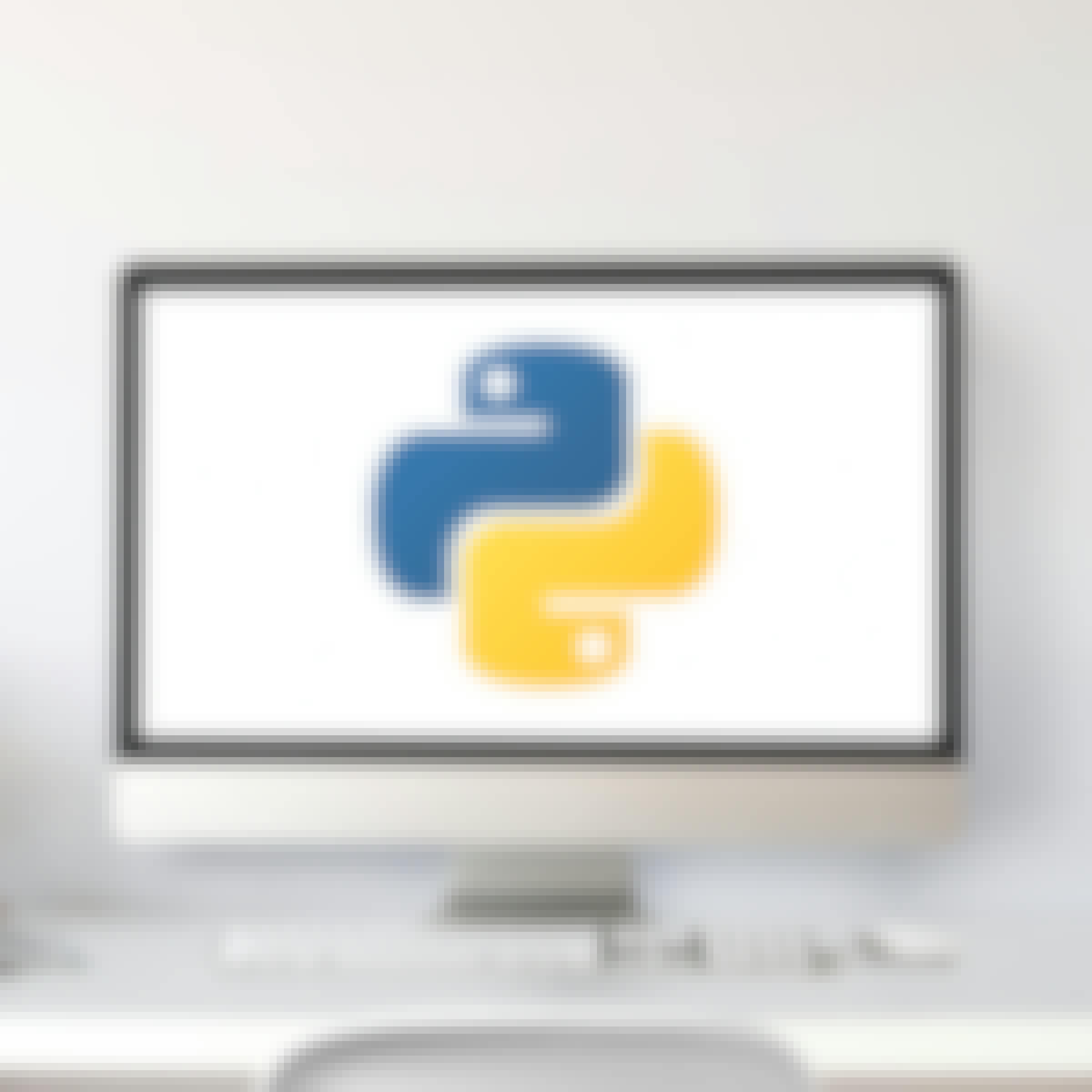 Status: Free TrialFree Trial
Status: Free TrialFree TrialSkills you'll gain: Data Import/Export, Programming Principles, Web Scraping, File I/O, Python Programming, Jupyter, Data Structures, Pandas (Python Package), Data Manipulation, JSON, Computer Programming, Restful API, NumPy, Object Oriented Programming (OOP), Application Programming Interface (API), Automation, Data Analysis
4.6·Rating, 4.6 out of 5 stars43K reviewsBeginner · Course · 1 - 3 Months
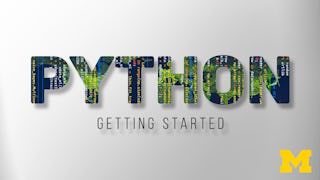 Status: Free TrialFree TrialU
Status: Free TrialFree TrialUUniversity of Michigan
Skills you'll gain: Programming Principles, Computer Programming, Python Programming, Computational Thinking, Software Installation, Development Environment
4.8·Rating, 4.8 out of 5 stars233K reviewsBeginner · Course · 1 - 3 Months
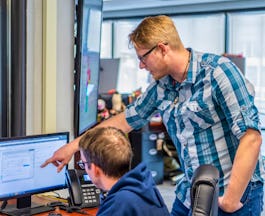 Status: Free TrialFree TrialG
Status: Free TrialFree TrialGGoogle
Skills you'll gain: Program Development, Programming Principles, Python Programming, Computer Programming, Computational Thinking, Problem Management, Data Structures, Integrated Development Environments, Debugging, Development Environment
4.8·Rating, 4.8 out of 5 stars40K reviewsBeginner · Course · 1 - 3 Months
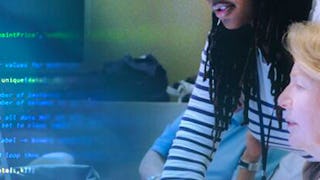 Status: Free TrialFree TrialU
Status: Free TrialFree TrialUUniversity of Michigan
Skills you'll gain: Database Design, Data Processing, Web Scraping, Data Visualization, Relational Databases, Restful API, Web Services, SQL, Databases, Data Visualization Software, JSON, Interactive Data Visualization, Extensible Markup Language (XML), Data Structures, Programming Principles, Data Cleansing, Network Protocols, Data Analysis, Python Programming, Computer Programming
Build toward a degree
4.8·Rating, 4.8 out of 5 stars280K reviewsBeginner · Specialization · 3 - 6 Months
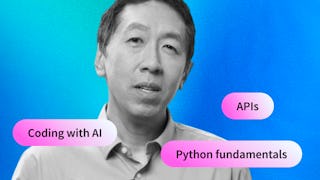 Status: PreviewPreviewD
Status: PreviewPreviewDDeepLearning.AI
Skills you'll gain: Large Language Modeling, Prompt Engineering, Artificial Intelligence, Jupyter, Python Programming, Data Analysis, AI Enablement, Application Development, Scripting, Programming Principles, Automation, Application Programming Interface (API), Debugging, Data Structures
4.8·Rating, 4.8 out of 5 stars232 reviewsBeginner · Course · 1 - 4 Weeks
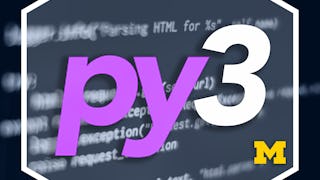 Status: Free TrialFree TrialU
Status: Free TrialFree TrialUUniversity of Michigan
Skills you'll gain: Debugging, Programming Principles, Program Development, Python Programming, Data Structures, Computer Programming, Computer Graphics, Diagram Design
4.8·Rating, 4.8 out of 5 stars18K reviewsBeginner · Course · 1 - 4 Weeks
What brings you to Coursera today?
 Status: Free TrialFree Trial
Status: Free TrialFree TrialSkills you'll gain: Object Oriented Programming (OOP), Unit Testing, Test Driven Development (TDD), Programming Principles, Software Testing, Data Structures, Python Programming, Computer Programming, Development Environment, Integrated Development Environments, Debugging, Django (Web Framework), Cloud Hosting
4.6·Rating, 4.6 out of 5 stars1.8K reviewsBeginner · Course · 1 - 3 Months

Skills you'll gain: Bash (Scripting Language), Python Programming, Unix Shell, Command-Line Interface, Programming Principles, Computer Programming, Scripting, Scripting Languages, Development Environment, Data Structures
4.6·Rating, 4.6 out of 5 stars3.1K reviewsBeginner · Guided Project · Less Than 2 Hours
 C
CCoursera
Skills you'll gain: Data Science, Web Applications, Python Programming, Programming Principles, Artificial Intelligence, Computer Programming, Scientific Visualization, Game Design
4.5·Rating, 4.5 out of 5 stars2.2K reviewsBeginner · Guided Project · Less Than 2 Hours
 Status: Free TrialFree TrialM
Status: Free TrialFree TrialMMicrosoft
Skills you'll gain: Web Scraping, Data Structures, Git (Version Control System), Generative AI, Version Control, Matplotlib, Devops Tools, Plotly, DevOps, Agile Methodology, Web Development, Data Ethics, Flask (Web Framework), Data Visualization, Scripting, GitHub, Debugging, Data Analysis, Automation, Cloud Computing
4.4·Rating, 4.4 out of 5 stars630 reviewsBeginner · Professional Certificate · 3 - 6 Months
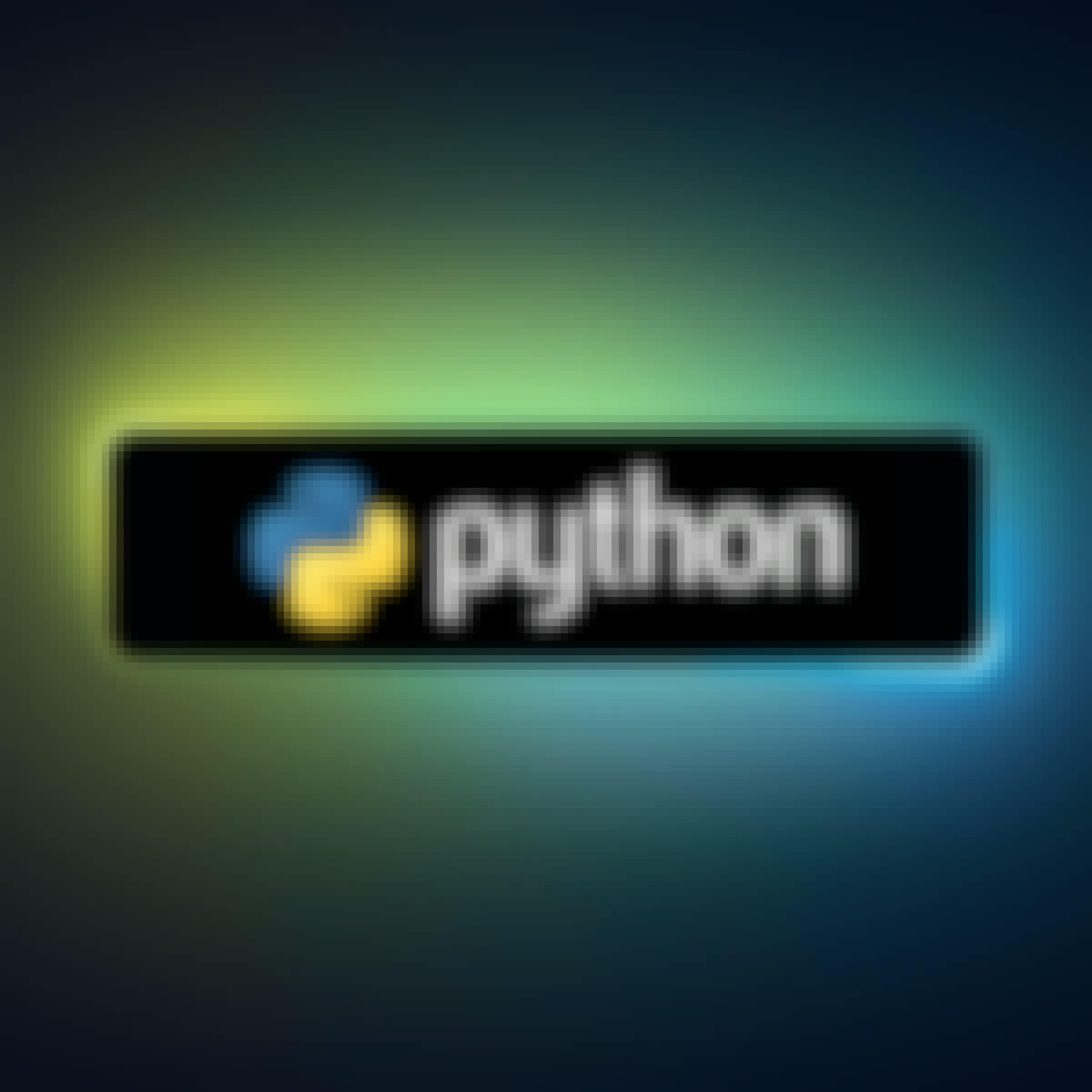 Status: NewNewStatus: PreviewPreviewJ
Status: NewNewStatus: PreviewPreviewJJetBrains
Skills you'll gain: File I/O, Data Structures, Python Programming, Programming Principles, Computer Programming, Scripting, Data Processing, Code Review, NumPy, Development Environment, Integrated Development Environments, Computational Thinking, Software Installation, Numerical Analysis
4.3·Rating, 4.3 out of 5 stars6 reviewsBeginner · Course · 1 - 3 Months
 Status: NewNewStatus: Free TrialFree Trial
Status: NewNewStatus: Free TrialFree TrialSkills you'll gain: Data Structures, Python Programming, Programming Principles, Computer Programming, Program Development, Object Oriented Programming (OOP), Scripting, Debugging, Scripting Languages, Algorithms, Functional Design
Beginner · Course · 1 - 4 Weeks
In summary, here are 10 of our most popular python for beginners courses
- Python for Data Science, AI & Development: IBM
- Programming for Everybody (Getting Started with Python): University of Michigan
- Crash Course on Python: Google
- Python for Everybody: University of Michigan
- AI Python for Beginners: DeepLearning.AI
- Python Basics: University of Michigan
- Programming in Python: Meta
- Create Your First Python Program From UST: Coursera
- Introduction to Python: Coursera
- Microsoft Python Development: Microsoft
Frequently Asked Questions about Python For Beginners
Python for beginners refers to introductory programming courses designed to teach the fundamentals of Python, a versatile and widely-used programming language. Learning Python is important because it serves as a gateway to various fields such as web development, data analysis, artificial intelligence, and automation. Its simple syntax and readability make it an ideal choice for those new to programming, allowing learners to focus on problem-solving rather than getting bogged down by complex code.
With a foundation in Python for beginners, you can pursue various job roles, including junior software developer, data analyst, web developer, and automation engineer. Many companies seek individuals who can leverage Python to streamline processes, analyze data, or develop applications. As Python continues to grow in popularity across industries, the demand for professionals with basic Python skills remains strong.
To learn Python for beginners, you should focus on several key skills: understanding basic programming concepts such as variables, data types, and control structures; learning how to write functions and handle errors; and becoming familiar with data structures like lists, dictionaries, and sets. Additionally, gaining experience with libraries and frameworks can enhance your learning and application of Python in real-world scenarios.
Some of the best online courses for Python for beginners include the BiteSize Python for Absolute Beginners Specialization and the AI Python for Beginners. These courses provide structured learning paths that cover essential topics and practical applications, making them suitable for those starting their programming journey.
Yes. You can start learning Python for beginners on Coursera for free in two ways:
- Preview the first module of many Python for beginners courses at no cost. This includes video lessons, readings, graded assignments, and Coursera Coach (where available).
- Start a 7-day free trial for Specializations or Coursera Plus. This gives you full access to all course content across eligible programs within the timeframe of your trial.
If you want to keep learning, earn a certificate in Python for beginners, or unlock full course access after the preview or trial, you can upgrade or apply for financial aid.
To learn Python for beginners, start by choosing an online course that suits your learning style. Dedicate regular time to practice coding, and work on small projects to apply what you've learned. Utilize resources like coding communities and forums for support and guidance. Consistency and practice are key to building your confidence and skills in Python.
Typical topics covered in Python for beginners courses include basic syntax, data types, control flow (if statements, loops), functions, and data structures (lists, tuples, dictionaries). Additionally, many courses introduce libraries and tools that enhance Python's capabilities, such as data visualization and web scraping techniques.
For training and upskilling employees, courses like the BiteSize Python for Absolute Beginners: Essentials and Web Scraping Tutorial with Scrapy and Python for Beginners are excellent choices. These courses provide practical skills that can be directly applied in the workplace, enhancing productivity and efficiency.










